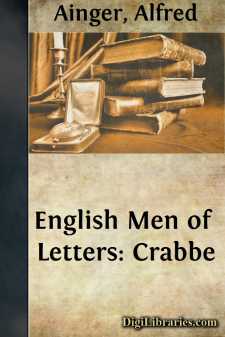Categories
- Antiques & Collectibles 13
- Architecture 36
- Art 48
- Bibles 22
- Biography & Autobiography 813
- Body, Mind & Spirit 142
- Business & Economics 28
- Children's Books 15
- Children's Fiction 12
- Computers 4
- Cooking 94
- Crafts & Hobbies 4
- Drama 346
- Education 46
- Family & Relationships 57
- Fiction 11828
- Games 19
- Gardening 17
- Health & Fitness 34
- History 1377
- House & Home 1
- Humor 147
- Juvenile Fiction 1873
- Juvenile Nonfiction 202
- Language Arts & Disciplines 88
- Law 16
- Literary Collections 686
- Literary Criticism 179
- Mathematics 13
- Medical 41
- Music 40
- Nature 179
- Non-Classifiable 1768
- Performing Arts 7
- Periodicals 1453
- Philosophy 64
- Photography 2
- Poetry 896
- Political Science 203
- Psychology 42
- Reference 154
- Religion 513
- Science 126
- Self-Help 84
- Social Science 81
- Sports & Recreation 34
- Study Aids 3
- Technology & Engineering 59
- Transportation 23
- Travel 463
- True Crime 29
English Men of Letters: Crabbe
by: Alfred Ainger
Categories:
Description:
Excerpt
CHAPTER I
EARLY LIFE IN ALDEBURGH(1754-1780)Two eminent English poets who must be reckoned moderns though each produced characteristic verse before the end of the eighteenth century, George Crabbe and William Wordsworth, have shared the common fate of those writers who, possessing a very moderate power of self-criticism, are apparently unable to discriminate between their good work and their bad. Both have suffered, and still suffer, in public estimation from this cause. The average reader of poetry does not care to have to search and select for himself, and is prone summarily to dismiss a writer (especially a poet) on the evidence of his inferior productions. Wordsworth, by far the greater of the two poets, has survived the effects of his first offence, and has grown in popularity and influence for half a century past. Crabbe, for many other reasons that I shall have to trace, has declined in public favour during a yet longer period, and the combined bulk and inequality of his poetry have permanently injured him, even as they injured his younger contemporary.
Widely as these two poets differed in subjects and methods, they achieved kindred results and played an equally important part in the revival of the human and emotional virtues of poetry after their long eclipse under the shadow of Pope and his school. Each was primarily made a poet through compassion for what "man had made of man," and through a concurrent and sympathetic influence of the scenery among which he was brought up. Crabbe was by sixteen years Wordsworth's senior, and owed nothing to his inspiration. In the form, and at times in the technique of his verse, his controlling master was Pope. For its subjects he was as clearly indebted to Goldsmith and Gray. But for The Deserted Village of the one, and The Elegy of the other, it is conceivable that Crabbe, though he might have survived as one of the "mob of gentlemen" who imitated Pope "with ease," would never have learned where his true strength lay, and thus have lived as one of the first and profoundest students of The Annals of the Poor. For The Village, one of the earliest and not least valuable of his poems, was written (in part, at least) as early as 1781, while Wordsworth was yet a child, and before Cowper had published a volume. In yet another respect Crabbe was to work hand in hand with Wordsworth. He does not seem to have held definite opinions as to necessary reforms in what Wordsworth called "poetic diction." Indeed he was hampered, as Wordsworth was not, by a lifelong adherence to a metre—the heroic couplet—with which this same poetic diction was most closely bound up. He did not always escape the effects of this contagion, but in the main he was delivered from it by what I have called a first-hand association with man and nature. He was ever describing what he had seen and studied with his own eyes, and the vocabulary of the bards who had for generations borrowed it from one another failed to supply him with the words he needed....


